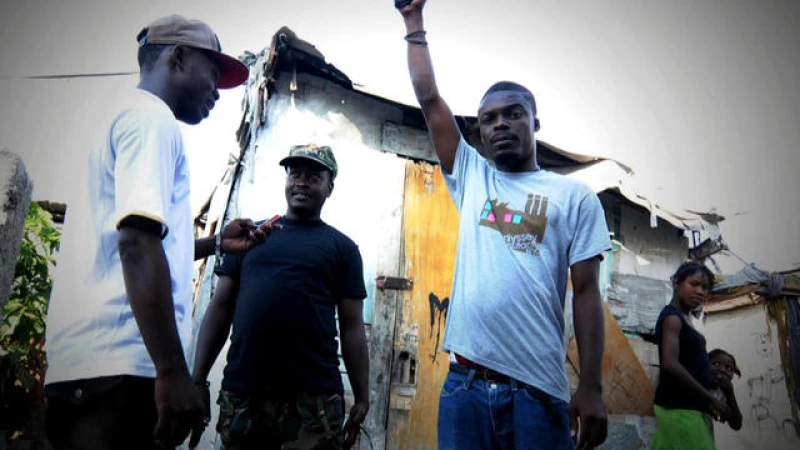How could Haiti even get to the point that its capital, Port-au-Prince, is paralyzed by armed gangs? For at least part of the answer, take a look at its history. You may find it hard to believe.
The island that Haiti shares with the Dominican Republic was visited by Columbus in 1492; he called it Hispaniola, claiming it for Spain. But Haiti eventually became a fabulously rich French colony, its plantations producing much of the world's coffee and sugar.
In 1791, the enslaved Africans who worked those plantations revolted. What followed was a 13-year bloodbath. Then, on January 1, 1804, Haiti traded the French flag for its own. It became the first Black republic, and abolished slavery.
But in 1825, the French came back, with gunboats, and an outrageous demand: reparations. Haiti had to borrow the money, with interest, from – yes! – France.
In today's currency, that would equal about $20 billion, according to Jake Johnston, the author of "Aid State," an analysis of the effects of foreign intervention in Haiti. "They wanted to be paid to recognize Haiti," said Johnston, "paid for their lost property, the enslaved population that had become an independent nation."
The reparations that Haiti had to pay France had a huge impact on the country, said Haitian journalist and activist Monique Clesca. "Knowing that you gain your freedom but you had to pay the ones who were holding you as a slave. ... It is a collective scar that we carry. So, it has a major impact, because we could've been better."
Instead of building roads and schools and hospitals, Haiti was paying off that debt until 1947.
And how important a factor was the United States' presence, and involvement? "I think it's hard to overstate," said Johnston.
In 1915, the U.S. sent in the Marines, took control of Haiti's finances, and occupied the country for 19 years. It has continued to play political puppeteer ever since.
Johnston said, "One reason why the United States ended up being a big, early supporter of the Duvalier dictatorship was because they were a bulwark against communism in the hemisphere."
When Papa Doc died in 1971, his 19-year-old son, Jean-Claude (known as "Baby Doc"), declared himself president for life, but was forced into exile in 1986. He took with him, by some estimates, as much as $800 million, stolen from the people of the poorest country in the Western Hemisphere.
Haiti actually held free and peaceful elections in 1991. Jean-Bertrand Aristide, a former priest, was elected president … and was overthrown just a year later. So much for stability.
Then, in January 2010 Haiti's worst earthquake in 200 years destroyed much of the capital, Port-au-Prince, and killed, according to Haitian officials, more than 200,000 people.
- The lost children of Haiti ("60 Minutes")
In the chaotic aftermath, dozens of gangs emerged. "They were working hand-in-hand with politicians," said Monique Clesca.
"So, you can't separate the gang situation from the political situation?" asked Teichner.
"No. Not at all," replied Clesca. "The gangs became empowered, the gangs were validated, armed, et cetera, by the economic and the political elite."
Since the assassination of President Jovenel Moïse in 2021, Ariel Henry has served as the country's unpopular, unelected prime minister. His resignation hinges on the establishment of a transitional council.
Meanwhile, the gangs united under Jimmy Chérizier (a.k.a. Barbecue) are making political demands.
- Gangs in Haiti try to seize control of main airport as thousands escape prisons: "Massacring people indiscriminately"
- Haiti capital Port-au-Prince gripped by chaos as armed gangs kill police, vow to oust prime minister
- Chaos unfolds in Haiti as Caribbean leaders call an emergency meeting
- Haitian Prime Minister Ariel Henry agrees to resign, bowing to international and internal pressure
So, what now? With the United States and other regional players trying to broker the transition, Clesca acknowledges that Haiti has rarely been in the hands of Haitians. "And it is a battle that we are waging to confirm, to affirm our sovereignty."
Haiti's history has been described as "a series of crises, with brief periods of hope and peace." Will this be one of those periods? Or the same-old story, doomed to failure?
"My heart tells me that it is 50/50," said Clesca. "But my head tells me it may be 80% might fail. But what I know is, we gotta take the chance, because we're dying every day."
- U.S. government charter flight to evacuate Americans from Haiti, as hunger soars: "There are a lot of desperate people"
- What is happening in Haiti? Here's what to know
For more info:
- "Aid State: Elite Panic, Disaster Capitalism, and the Battle to Control Haiti" by Jake Johnston (St. Martin's Press), in Hardcover and eBook formats, available via Amazon, Barnes & Noble and Bookshop.org
- Haitian journalist-activist Monique Clesca
Story produced by Kay Lim. Editor: Emanuele Secci.
See also:
- Mitch Albom's Haiti orphanage ("Sunday Morning")
- Web extra: The Have Faith Haiti Mission & Orphanage in Port-au-Prince ("Sunday Morning")
- Haiti by the numbers ("Sunday Morning")
- Asylum-seeker from Haiti finds an army of supporters in Cleveland ("Sunday Morning")
- Haitian conjoined twins get help from a native son ("Sunday Morning")







